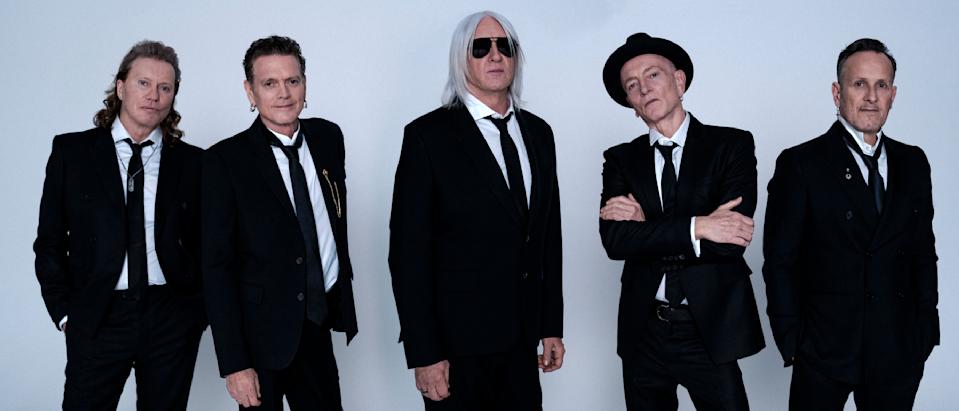Diamond Star Halos, the 12th studio album by Sheffield rock legends Def Leppard, is a full-circle record in more ways than one. For instance, fist-pumping stadium anthems like the fittingly titled “Kick” and “Fire It Up” are reminiscent of Pyromania — the classic first Lep album to feature guitarist Phil Collen, who joined the band almost exactly 40 years ago, in June 1982. The album also taps into the group’s ‘70s glam-rock influences — its title is a nod to Marc Bolan and T. Rex — like never before.
“Me and Joe had pretty much identical record collections before we even knew each other,” Collen chuckles, as he and Leppard frontman/glam-rock obsessive Joe Elliott speak to Yahoo Entertainment about the new LP. “Marc Bolan, the Bowie stuff, all of that. … It was only halfway through [making] the album that we [realized] were pretty much celebrating the era that got us kind of baptized into music.”
[embedded content]
“We have so much fun doing all sorts of music… but glam was the one that floated to the top,” says Elliott. “Because watching the likes of Pink Floyd and whatever on The Old Grey Whistle Test, it was great to watch, but it didn’t have the oomph of watching Sweet or Slade or Bowie or T. Rex on Top of the Pops — who would come out dressed in all this ridiculous garb, play three-minute hardcore pop/rock, big choruses, massive guitars, massive drums. It was rock, but it was dressed up as pop, I suppose. And we’d all just got color TVs [in 1971]! So, this stuff was really making a massive impact on our brains as 10, 12, 14-year-old kids. … It was like really cool aliens landing on Earth and handing out candy. It was amazing.”
Fast-forward a decade later, and Def Leppard were on television themselves, as one of the first hard rock acts to receive high-rotation airplay on a new cable network called MTV. They arguably laid down the foundation for dozens of bands that would soon be labeled “glam-metal” in the mid-to-late ‘80s, but few of the Headbanger’s Ball-era bands truly descended from the glam-rock tradition the way Def Leppard did, aside from wearing long, poodly hair or the occasional feather boa. When asked if he thinks Lep were indeed responsible for the hair-metal boom —or backlash — Elliott flatly answers, “I think we side-stepped it.”
“I always found it fascinating that the media chose to lump us in with that, just because we had two guitars and made rock music of a certain style,” Elliott elaborates. “We couldn’t have been further removed from this ‘glam-metal’ thing. People called it ‘hair-metal.’ I just find it the most ridiculous term — because does that make Robert Plant hair-metal, because he’s got hair down to his shoulders? Or these days, Paul Weller? It’s just a dumb, lazy media term. I think it’s also fair to say, without blowing our trumpet too much, that we survived way beyond all those bands, or the majority of them, because we were always more than that.
“There’s a certain thing where we have a song like ‘Pour Some Sugar on Me,’ and then a dozen bands rip it off. And we tragically get dragged into the same whirlpool that they’re sliding down,” Elliott continues. “We did something really innovative, and what happens is A&R men at record labels go, ‘Sign me a band that sounds like Def Leppard!’ And you end up with 200 Def Leppards. And then you end up with Kurt Cobain, who goes, ‘Enough!’”
Famously, a decade after MTV’s debut and a few years after MTV hit saturation point with all of those Def Leppard wannabes, Cobain and Nirvana swooped in with “Smells Like Teen Spirit” to usher in an alt-rock revolution. Many of Leppard’s peers didn’t survive the transition, but Def Leppard, who were inducted into the Rock & Roll Hall of Fame by Queen’s Brian May in 2019, maintained their cred. “I’m convinced — I almost kind of got it almost from the horse’s mouth, with Dave Grohl — that Kurt Cobain would’ve been fine with us. It was the millions of us that he couldn’t handle,” Elliott explains. “And I completely understand that. It’s just one of those things that it’s just part of what happens. And I think one of the reasons we survived is because we took it on the chin. We took it with a good sense of humor and went, ‘Well, it’s nothing to do with us. There’s nothing we can do about it. So, just move on and keep making records and see what happens.’”
[embedded content]
And that’s just what Def Leppard have done with the excellent Diamond Star Halos. Of course, during the past four decades, Def Leppard have had to endure setbacks far more catastrophic than mere shifts in pop-music trends — like drummer Rick Allen losing his arm in a 1985 car crash, or guitarist Steve Clark dying at age 30 in 1991. (They’ve withstood enough hardship to be the subject of a made-for-TV movie, VH1’s Hysteria: The Def Leppard Story, back in 1999, long before rock biopics were in vogue — although Elliott, who grudgingly served as the VH1 film’s unofficial “script doctor,” says he has “kind of haunting nightmares” about that low-budget project, and humbly argues that tragedy-beset band Lynyrd Skynyrd should get the proper big-screen biopic treatment before Leppard do.)
“You take any group of people, any family, any band that stays there, they have tragedy,” says an equally humble Collen. “Most bands don’t have that long, and you know, we’re just getting going. … So, you are going have a history of terrible things happening, along with the great stuff that continues to happen as well.”
“If you stick around long enough, you learn to take the hits and the lows and just say, ‘Oh well, we’ve been there before,’” says Elliott. “When somebody comes bursting into a room going, ‘Oh my God, you won’t believe what’s happened!’ — we just go, ‘Yes, so what? Just move on. Been there, done that. No big deal. By the way, I’ve written a new song. Wanna hear it?’ And this new album is the epitome of that.”
[embedded content]
In another full-circle career development, it was Def Leppard’s ability to adapt — not just to personal tragedy, but to new studio technology, which they embraced while recording 1987’s Hysteria after Allen’s accident — that helped them create Diamond Star Halos under difficult and unforeseen circumstances. Literally within an hour of learning that their 2020 tour with Mötley Crüe, Poison, and Joan Jett had been indefinitely delayed due to the COVID-19 pandemic, “We took one phone call — 30 minutes — to go, ‘F*** that! We’re gonna do this!’” The Leppard members, spread out across Ireland, England, and the United States, immediately began working remotely, a process that Collen surprisingly describes as “totally a dream.”
“I don’t think we ever want to go back to recording the traditional sense ever again, because it was inspiring working this way,” raves Elliott. “There was no time limit. We didn’t have a deal. When we started the record, we didn’t have an end date. So, we just did this as a piece of art. And it worked out amazingly. … In fact, it enhanced the songwriting. It took the blinkers off. It broadened our horizons. Nothing was off the table. When Phil said, ‘I’ve got a song with a ukulele in it,’ I’m like, ‘OK, great!’ I said, ‘I’ve written two on the piano,’ and he’s like, ‘Fine!’ And then he’s like, ‘Let’s get Alison Kraus on board! Let’s get [longtime Bowie pianist] Mike Garson on board!’
“This is technology coming to our advantage once again, similar to how it was in the ‘80s with the studio gear,” Elliott explains. “But this time, it was the internet. It was all the applications that you can use on a laptop to literally turn a MacBook pro into the new Abbey Road.”
[embedded content]
Read more on Yahoo Entertainment:




